The opportunity for students to vote on, or near, campus could be a major step to encouraging younger voters to get to the polls.
With midterm elections just a week away, all eyes are on younger voters, who have been historically absent in all elections, but particularly in midterms.
Joseph Garcia, director of communication and community outreach at the Morrison Institute for Public Policy at Arizona State University, said that having a voting location on campus, like the one on ASU's Tempe campusStudents and community members can vote at the Palo Verde West building., helps to normalize the act of voting.
“When the peer groups and millennials see other millennials voting, and millennials talking about voting, it becomes a little bit more of accepted behavior,” Garcia said. “As opposed to a foreign thing where you have to go someplace else, and then you vote and you go back to your real life.
“So I think that it is a big plus to be able to vote on campus because then you are seeing that other people like you are participating.”
Garcia said that there is a disconnect between younger voters' activism on social media and their actual civic vote.
“Millennials are talking about politics through Instagram and texting and other forms of social media, but that does not equate into a vote,” Garcia said. “There needs to be the connection and the point made for millennials that while yes, free speech is important to democracy, your voice becomes muted, muffled and squelched if you’re not following that up with a vote.”
But the responsibility isn’t only on the students, Garcia said, with politicians also showing a disconnect between the issues that are important to millennials.
“Politicians need to listen, and not tell millennials what they need to be concerned about,” Garcia said.
“I think it’s important to know that politics today is built on the politics of yesteryear, whereas millennials are really built towards tomorrow — so the politics of today have to become more about tomorrow. What is the world tomorrow? Not so much what it was yesterday or even what it is today.”
One of the factors that is turning away voters, both young and old, is the negative atmosphere of politics today.
But one group on campus is trying to remedy that culture, by opening a dialogue about important issues, without a partisan angle.
Josh Fixel, the president and founder of Bridge at ASU, encourages a merit-based dialogue on policy issues at meetings for his club. As politics continues to become more negative, Fixel said young people are being turned away.
“I think over the past decade you've noticed people just become more aggressive when they talk about politics and then resort to attacking the person who said the idea,” Fixel said. “I think that's the real problem is just not being open-minded. What Bridge (at ASU) does, is we really stress that everyone comes in with an open mind and we (are) really trying to push you to expose yourself to a new way of thinking."
Fixel thinks that a lack of knowledge can be a hinderance to young voters.
“A lot of times, even if they do vote, sometimes they just vote straight ticket or whatever based on what their parents told them, or the news they listened to, or like the friends that they influenced themselves with.
“And that's not necessarily better than nonvoting.”
But Fixel also says that students are too busy to think about politics.
“I think genuinely students are just too busy to care unless they are in a political field,” Fixel said. “So I think creating that interest and showing students why or how politics affects all of us is the key, because I don't think students realize that policy truly affects you no matter what field you're in.
“It comes down to showing students the importance of each of these issues and showing how they truly affect everyone in different ways.”
Fixel said that the polling locations are helpful as a means of convenience for students, and that regardless of what party or political leaning a student subscribes to, it is important for them to vote on Nov. 6.
Here are the closest voting locations to each ASU campus:
Note: Election day hours are 6 a.m. to 7 p.m. It is important to make sure that you are voting in the correct precinct. To be sure, you can enter your exact address at this link from the Maricopa County Recorders Office to find your polling location: https://recorder.maricopa.gov/pollingplace/. Note that there are some locations called Bonus Vote Centers that are open to all registered voters, such as the location on the Tempe campus.
Tempe campus
Arizona State University
330 E. University Drive, Palo Verde Room 151
(Open to anyone, regardless of precinct)
Downtown Phoenix campus
Salvation Army Phoenix Citadel Corp
632 N. Third Ave.
West campus
Washington Elementary School District Office
4650 W. Sweetwater Ave., Glendale
Polytechnic campus
Highland Junior High School
6915 E. Guadalupe Road, Mesa
Top photo: Early voting is available to students and community members at Palo Verde West on the ASU Tempe campus. Photo by Marcus Chormicle/ASU Now
More Law, journalism and politics
Can elections results be counted quickly yet reliably?
Election results that are released as quickly as the public demands but are reliable enough to earn wide acceptance may not always be possible.At least that's what a bipartisan panel of elections…
Spring break trip to Hawaiʻi provides insight into Indigenous law
A group of Arizona State University law students spent a week in Hawaiʻi for spring break. And while they did take in some of the sites, sounds and tastes of the tropical destination, the trip…

LA journalists and officials gather to connect and salute fire coverage
Recognition of Los Angeles-area media coverage of the region’s January wildfires was the primary message as hundreds gathered at ASU California Center Broadway for an annual convening of journalists…


